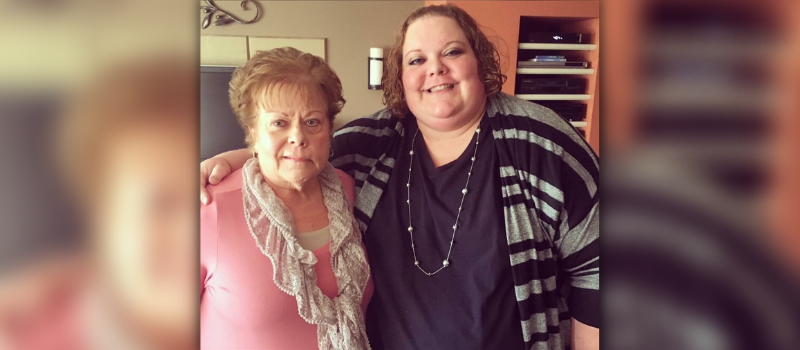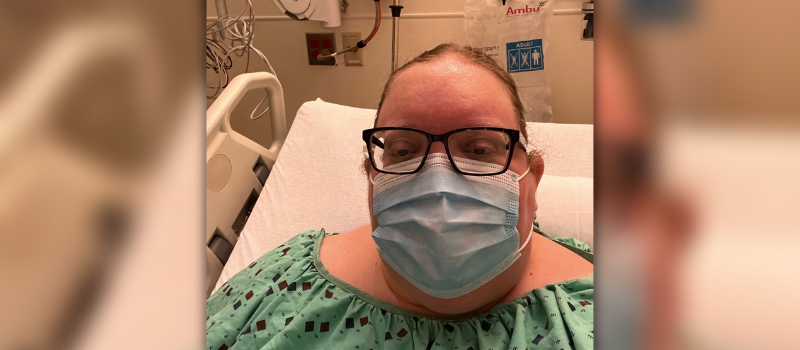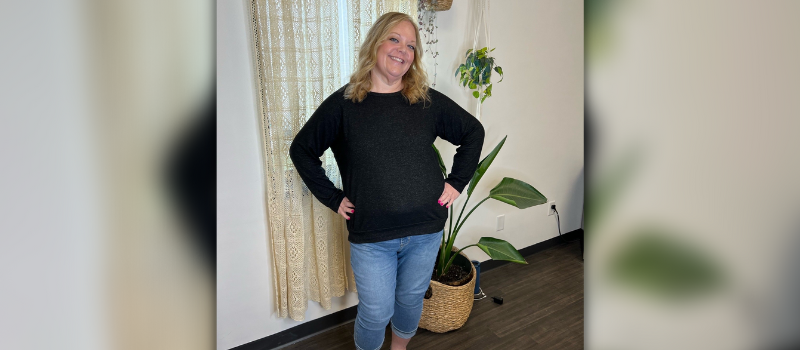After receiving bariatric surgery at IU Health North in November 2021, Megan Carr has lost more than 200 pounds. Now, she’s focused on feeling healthy.
By Charlotte Stefanski, cstefanski@iuhealth.org, writer for IU Health’s Indianapolis Suburban Region
Megan Carr had struggled with weight her entire life.
Like many others, she gained a few pounds during COVID-19, but by 2021, she was at her heaviest weight of 485 pounds, and she knew she had to make a change.
Carr has been a team member at IU Health for 12 years, starting out as a buyer for pathology labs. Currently, she is a portfolio manager for supply chain contracts, which includes respiratory, anesthesia, lab, and wound care service lines.
Just over five years ago, Carr’s mother passed away suddenly due to blockages in her heart.

“My mom was my very best friend. She was just a huge support system. We were very, very close, so watching her die was hard,” Carr said. “Some of the conditions she had could have been prevented if she had taken better care of herself. She was one of those people that took care of everyone else around her.”
While losing her mother was difficult, Carr became inspired to take better care of herself. She not only wanted to watch her nieces and nephew grow up, but she wanted to be active in their lives.
After connecting with the bariatric team at IU Health North Hospital one year ago, she’s been able to lose 235 pounds.
“I thought I needed to live for (my mom), the life that she could have continued to live, had she taken better care of herself,” Carr said.
‘I needed to do something drastic’
Carr had tried every diet in the book. From Weight Watchers to keto, nothing seemed to work. If she lost weight, it always seemed to come back.
She began researching other options and came across bariatric surgery—a type of surgery that helps to reduce food consumption and helps with weight loss by removing a part of stomach.
“I needed to do something drastic so that I couldn’t slip off this diet. I had to do this, I had to change the physical makeup of my body and make that stomach smaller,” she said.
Carr came across IU Health North’s bariatric surgery program, which included not only surgery, but expertise on nutrition, fitness and psychology.
Dr. Ambar Banerjee, Carr’s bariatric surgeon, explained that while many associate weight loss with bariatric surgery, it is much more than that.
“In today’s world, we call it metabolic surgery, because it tends to improve the metabolic rate of the patient,” he said. “This leads to not only weight loss, but also improvement of medical problems patients have that are directly related to obesity or weight gain.”
Those medical problems include type two diabetes, high blood pressure, high cholesterol, obstructive sleep apnea and more.
Bariatric surgery can be broadly classified into three different categories; a restrictive procedure, where the patient’s ability to eat more is restricted; a malabsorptive approach, where there is absorption of less nutrients in the body; and the third category is a combination of the two, restrictive and malabsorptive.
The procedure Carr received is called a a Roux-en-Y gastric bypass, a combination of both a restriction and malabsorption.
Prior to receiving surgery, Carr worked with nutritionists to develop a low-carb and low-fat diet plan. The goal was to drop 50 pounds in a six-month period, where Carr would check-in monthly to see her progress. She also had to undergo a psychiatric evaluation to ensure she was mentally prepared for such a drastic surgery.
“I could tell Dr. Banerjee cared about me as a patient. Even when I first met him, he just he continued to say, ‘This will change your life in ways you probably wouldn’t think about,’” Carr said. “He was just always very encouraging. I didn’t feel like just another number, I felt like he truly cared.”
Carr was able to lose 55 pounds, bringing her weight down to 430 before her procedure. She knows that some might consider the surgery an easy way out, but she stresses that it’s not. It’s something she’s had to work on every day.
“The dietitians, the surgeon and the nurses, they set up a program for you to be successful, and you just have to follow it,” Carr said. “That’s why I think I’ve had so much success. I’m one of those people, that when I get something in my mind, I’m going to do it.”
Seeing year-long success
On Nov. 19, 2021, it was time for Carr to go from team member to patient. While she was a little nervous, she found plenty of support in her care team.
From the nurses manning the phones to Dr. Banerjee, Carr said everyone was helpful and available. As she walked into the surgical area, Carr received cheers from the team.
“In that moment, when it’s happening and as you’re getting on the bed, you’re really nervous,” Carr recalled. “They cheered for me because they knew what I had done to get there to that point and all the hard work. I was just excited to start my new life.”

To qualify for bariatric surgery, Dr. Banerjee explained that a patient typically needs a Body Mass Index (BMI) of 40, or a BMI of 35 with health problems related to obesity. During Carr’s initial consultation, her BMI was around 70.
“Depending upon the initial weight of the patients, we do a vast majority of our bariatric surgeries—but not all of them—laparoscopically or robotically with small incisions,” Dr. Banerjee said. “That is the reason we have such good outcomes, because open surgery is related with a lot more risk for complications.”
With the Roux-en-Y procedure, patients typically lose weight for one-and-a-half to two years. Post-surgery, Carr remembers her stomach being a little extended, but once her scars began to heal, she noticed the weight beginning to fall off.
People started noticing Carr’s weight loss, her clothes began to fit more loosely and most importantly, she felt better and could do more.
Her health problems related to her weight, including obesity, type 2 diabetes and high blood pressure, were also improving or already gone.
“I didn’t realize how bad I felt. Even just going to the grocery or shopping at a store, I would get tired very easily,” Carr said. “I kind of limited what I did in activity.”
After losing more than 200 pounds, she can keep up with friends while traveling and play games with her nieces and nephews.
While losing weight comes at a more gradual pace now, she’s still trying to catch up mentally after having such a life altering procedure.
“I still see myself as the Megan that started this process, but now I’m different in how I physically look. In almost a year, it’s weird to think about. I hear those numbers and people say, ‘Oh, you look great,’” Carr said. “It’s still kind of surreal, because for so long, I was the picture of terrible health, and now it’s the opposite.”

Dr. Banerjee knows there is a lot of hesitation from patients when it comes to bariatric surgery. It’s not an emergency procedure of a condition that needs immediate help, it’s a choice. However, it’s a choice that can lead to a healthier and longer life.
“They have to make that first move. We are there to help them support them and get them through the process,” he said.
Sharing her story
While undergoing bariatric surgery was a personal choice for Carr, she wasn’t alone in her journey. About a week before her procedure, she began documenting her journey on TikTok and Instagram.
It was mainly for her, so she could go back and look at her progress, and it was also a way for her friends and family to stay updated. She didn’t expect to find a community.
“I shared the good, the bad, the ugly. Whatever it is, I’ll share it,” Carr said. “But in doing that, I found this community of other bariatric patients that live all over the United States.
Those viewing her journey on social media also shared their good, bad and ugly, as well as recipes or post-surgery tips. It helped Carr feel connected and inspired throughout the process.
Every month, she posts a video with pictures of her progress, sometimes getting more than 1,000 views.
“It’s connected me to people in a deeper way, because they see what’s going on with me,” she says.
Dr. Banerjee adds that having a strong support system is important for bariatric patients because there will be some hard days, both before and after surgery.
“This is a journey. This surgery, unlike most other surgeries that we perform, doesn’t guarantee success alone,” he said. “This surgery needs to be followed up with a lot of hard work, a lot of motivation and there are going to be moments when it feels very depressing for these individuals.”
Now a year out from her procedure, Carr continues to be focused on being healthier—both in nutrition and activity. A goal of hers is to one day walk or run a marathon, possibly the Disney Princess Marathon with her sister-in-law.
Carr was 41 years old when she had her procedure—and for anyone on the fence about bariatric surgery—she says don’t wait that long. She encourages those interested to research IU Health’s bariatric programs and speak with those leading it.
While it is life changing, and can be overwhelming in the beginning, Carr said it becomes it becomes second hand.
“I wish I wouldn’t have waited so long, because I feel like I put my life on pause when I was overweight. I wasn’t doing all the things that I needed or wanted to do,” Carr said. “If I could go back and talk to younger Megan, I would say, ‘Just get the surgery, just get it. Don’t wait, because your life will just completely change.’”
